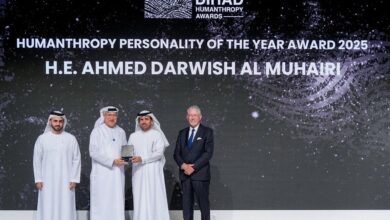DISAB Meeting & United Nations (OCHA) Sets the Stage for DIHAD 2025: A Global Call for Humanitarian Unity

H.E. Amb. Dr. Abdulsalam AlMadani, Roving Ambassador for the Parliamentary Assembly of the Mediterranean for the GCC, Chairman of DIHAD Sustainable Humanitarian Organisation, and Chairman of (DISAB), welcomed the members of the DIHAD International Scientific Advisory Board (DISAB) who gathered for the board’s annual meeting, held today at the Dubai World Trade Centre, marking a pivotal moment in shaping the future of humanitarian work.
The meeting included participants representing a distinguished array of organizations, including Parliamentary Assembly of the Mediterranean (PAM), DCAF Genève Center for Security Governance, International Organization for Migration (IOM), United Nations, United Nations High Commissioner for Refugees (UNHCR), Noor Dubai Foundation, UAE Red Crescent Authority, University of Manchester, International Federation of Red Cross and Red Crescent Societies (IFRC), United Nations Office for the Coordination of Humanitarian Affairs (UN OCHA), Terre des Hommes, World Food Programme (WFP), International Committee of the Red Cross (ICRC), and Dutch Advisory Council on International Affairs.
The meeting was chaired by H.E. Amb. Dr. Abdulsalam AlMadani, Roving Ambassador for the Parliamentary Assembly of the Mediterranean for the GCC, Chairman of DIHAD Sustainable Humanitarian Organisation, and Chairman of (DISAB). During the meeting, the main theme for DIHAD 2026 was discussed, reflecting a proactive approach to tackling future humanitarian challenges.
Eng. Khaled Al Attar, Director-General of DIHAD Sustainable Humanitarian Organisation, shared valuable insights into the organization’s latest initiatives and strategic plans aimed at strengthening cross-border humanitarian collaboration. The discussions centered around critical areas such as scaling effective solutions in conflict zones, fostering robust public-private partnerships, and navigating the increasingly complex global aid landscape. Additionally, the board set the theme for DIHAD 2026, marking a forward-looking approach to addressing future humanitarian challenges.
Members of DISAB proposed a range of thoughtful topics for next year’s theme, with the goal of addressing critical humanitarian challenges and promoting meaningful dialogue on global collaboration and innovative solutions.
Moreover, discussions emphasize the importance of unity in the face of growing global divisions. The board underscored the need for a collective approach to address humanitarian challenges, advocating for a shift from reactive assistance to a more proactive, transformative model that prioritizes inclusivity, sustainability, and long-term solutions.
The DIHAD Pre-Conference Workshop, organized in collaboration with the United Nations Office for the Coordination of Humanitarian Affairs (UNOCHA), was held under the theme: “Ethics in Action: Upholding Humanitarian Values and Ethics Amidst Global Divides”.
The workshop gathered distinguished experts, policymakers, and humanitarian professionals to engage in thought-provoking discussions on the ethical challenges facing the humanitarian sector in today’s polarised world. The sessions also emphasized the critical role of ethical frameworks in guiding humanitarian action and ensuring that aid reaches those who need it most, while preserving trust and integrity within the global humanitarian community.
The reaffirmation of the strategic collaboration between DIHAD and the United Nations Office for the Coordination of Humanitarian Affairs (UN OCHA). Ms. Sajeda Shawa, Head of OCHA UAE Office, emphasized that: “Advocacy remains at the core of OCHA’s mission, and it is essential that we continue sharing and amplifying the humanitarian efforts of all humanitarian actors delivering lifesaving aid at the most difficult times for humanitarians globally. Over the years, this meeting has become an integral part of DIHAD, and we are proud to reaffirm our commitment to hosting it in the years to come. This year, we welcomed over 60 registered participants from the Middle East, Africa, and Latin America, with the strong support of the UAE government represented by UAE-MOFA, UAEAID, and Anwar Gargash Diplomatic Academy. We were also honored by the participation of H.E. Alison Milton, Ambassador of Ireland to the UAE, Kuwait, and Qatar, along with a distinguished lineup of international and Emirati speakers, bringing rich perspectives on humanitarian coordination, leadership, humanitarian principles, private sector engagement, communication and misinformation as well as innovation to our discussions.”
The discussions focused on how the UAE’s forward-looking vision and unwavering commitment to innovation have firmly positioned it as a global leader in humanitarian aid. This strategic model not only addresses urgent humanitarian needs but also supports long-term development, resilience, and stability in crisis-affected regions. Several critical themes emerged throughout the dialogue, shaping the future direction of humanitarian action. Central to these was the UAE’s pioneering role in humanitarian diplomacy, underlining its innovative, impactful contributions on the global stage. The importance of transformative leadership during times of polycrises was also emphasized, highlighting the need for agile, visionary strategies to manage complex, interlinked global challenges. Climate justice featured prominently, with strong calls for investing in fair, inclusive, and systemic solutions that ensure sustainability and equity in crisis response. Additionally, the treatment of individuals in conflict zones as data subjects raised serious ethical considerations—ranging from misinformation and disinformation to bias, lack of transparency, data breaches, and the safeguarding of sensitive personal information. The core humanitarian principles and the strategic use of humanitarian negotiations—particularly those rooted in International Humanitarian Law (IHL), were highlighted as essential tools in navigating an increasingly divided world. Lastly, participants reflected on the profound impact of DIHAD as a dynamic hub for humanitarian thought leadership and an influential annual platform for cross-sector collaboration, innovation, and global engagement.
The 21th edition of the Dubai International Humanitarian Aid and Development Conference and Exhibition (DIHAD), organized under the esteemed patronage of His Highness Sheikh Mohammed bin Rashid Al Maktoum, Vice President and Prime Minister of the UAE and Ruler of Dubai, is poised to kick off tomorrow with a projected attendance of over 18,000 delegates representing 160 countries. DIHAD stands as a pivotal platform for fostering international collaboration in humanitarian endeavors.






Leave feedback about this